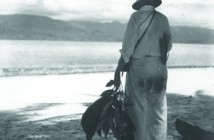Erick Hernandez, 30, was an aircraft machinist’s mate in the U. S. Navy immobilized with a spinal cord injury. But one day in early November he was stepping onto a platform and grooming the smooth coat of a handsome paint horse on a peaceful country ranch – about as far from the carrier flight deck as you can be..
Hernandez is one of more than 180 returned veterans whose lives are being changed through the Horses Helping Heroes program at Good Hope Equestrian Training Center in the Redlands. Using the power of equine-assisted activities to aid in the rehabilitation of service men and women suffering from post-traumatic stress disorder, traumatic brain injury and spinal cord injury, GHETC is dedicated to meeting the rehabilitative needs of veterans across South Florida.
Director Peggy Bass at paddock with disabled children“Our research has shown that equine activities benefit disabled participants through increased mobility, improved balance, posture and core strength, as well as enhanced coordination and flexibility,” said Brooke E. Westmoreland, MS/OTR, the therapist from the Spinal Cord unit. “Not only does working with horses improve the veterans physically; it also increases self-confidence, communication, trust and anxiety reduction, as well as decreased feelings of isolation, anxiety, depression and other mental illnesses,” she added.
On a recent day at Good Hope farm, seven veterans including Hernandez had a fabulous day riding, as well as caring and grooming for their equine partner. The group represented several different services: Nafiz Mohammed had served aboard ship in Iraq, Robert Barker and Dennis Mahan were Army veterans, and Fernando Delbusto was an Army top Sargeant in the Vietnam War.
“The horse’s movement at the walk is three-dimensional, which precisely mirrors the movements of the human pelvis. When a person sits upright on the back of their equine partner, these three human pelvic movements are duplicated naturally without effort on the rider’s part. The horse’s natural power has great benefits for a person who cannot walk.,” Westmoreland said, “so in re-learning to walk, riding horses is helping these vets. Riding is also a great confidence builder for those shaken by combat, and suffering from low self-esteem because they survived and many of their buddies didn’t.”
Erick Hernandez and Steppin With StyleOnly a quarter of the vets at Good Hope have previously participated in any equestrian activities prior to enrolling into the program. “Once each rider demonstrates the ability to control their horse at the walk and the trot,” explained Peggy Bass, GHETC Executive Director, ‘the veterans are able to move from the riding ring to the on-site trails course. These sessions help the participants with impulse modulation, independence and relaxation, which in return helps them to connect and effectively communicate with their designated horse.”




3 Comments
Thanks very much for running this story. The children and veterans at Good Hope will benefit from your help.
David
Thanks to SOMI magazine for running this article on Good Hope Equestrian Training Center. Anyone wishing to talk to Peggy Bass, the Executive Director, may call her at 305-297-4729.
This is great. I too love horses and am transported to another world when I am with them. This is real support for our veterans, not just lip service and feel good one time events.